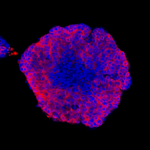
- Title Postdoctoral Associate – Saeed Lab
- Education BSc(Hons), PhD
- Office 501/Saeed Lab/NEIDL
- Area of Interest Virology, Stem cell, Innate immunity
I am a Postdoctoral Associate in the laboratory of Dr. Mohsan Saeed at the Department of Biochemistry and the National Emerging Infectious Diseases Laboratories (NEIDL) of Boston University. I obtained my Ph.D. degree from the Department of Pathology at the University of Otago, New Zealand, where my graduate work identified synthetic lethal drug candidates for the treatment of various cancers driven by mutations in the cohesion gene. After completing my Ph.D., I did a short stint as a Research Associate at the University of Otago, investigating the role of IL-6 promoter single nucleotide polymorphism (SNP) variants in colon cancers and the clinical relevance of these SNPs in predicting the disease outcome.
In the Saeed lab, the overall goal of my research is to investigate how enteroviruses hijack the host cell machinery to promote their replication. For these studies, I am using induced pluripotent stem cells (iPSC)-derived culture systems and humanized mice, allowing investigation of virus-host interactions in a physiologically relevant setting. The major focus of my enteroviral studies is enterovirus D-68 (EV-D68), which has emerged as a respiratory pathogen of concern in children worldwide. First isolated in 1962 in the United States, EV-D68 caused only sporadic, mild respiratory infections in the country until 2014, when the first large-scale outbreak of the virus was reported, documenting cases of severe respiratory infections in children in all 50 states. Curiously, several of these children went on to develop acute flaccid myelitis (AFM), leading to permanent disabilities and/or deaths. Since 2014, two more outbreaks, one in 2016 and another in 2018, have been reported in the United States. It remains unclear how EV-D68 developed an epidemic potential in 2014 and what are the viral and host determinants of the severe respiratory disease caused by the virus. My research employs multiple experimental strategies to answer these questions.
In addition, I am also investigating the role of enteroviral proteases in disarming the human antiviral innate immune system, which is the first line of defence against viral and non-viral pathogens. Our previous studies have identified a large number of cellular proteins that are cleaved by enteroviral proteases during infection. I am systematically analysing the role of these cleavage targets in antiviral immunity with the major goal to unravel the molecular details of how viral proteases modulate immune responses through proteolytic cleavage of host proteins.
Publications
1. van der Werf, J., Chin, C. V., & Fleming, N. I. (2021). SnoRNA in Cancer Progression, Metastasis and Immunotherapy Response. Biology, 10(8), 809. https://doi.org/10.3390/biology100808092. Antony, J., Chin, C. V., & Horsfield, J. A. (2021). Cohesin Mutations in Cancer: Emerging Therapeutic Targets. International journal of molecular sciences, 22(13), 6788. https://doi.org/10.3390/ijms221367883. Chin, C. V., Antony, J., Ketharnathan, S., Labudina, A., Gimenez, G., Parsons, K. M., He, J., George, A. J., Pallotta, M. M., Musio, A., Braithwaite, A., Guilford, P., Hannan, R. D., & Horsfield, J. A. (2020). Cohesin mutations are synthetic lethal with stimulation of WNT signaling. eLife, 9, e61405. https://doi.org/10.7554/eLife.614054. Ahn, J., Lee, J. G., Chin, C., In, S., Yang, A., Park, H. S., Kim, J., & Park, J. H. (2018). MSK1 functions as a transcriptional coactivator of p53 in the regulation of p21 gene expression. Experimental & molecular medicine, 50(10), 1–12. https://doi.org/10.1038/s12276-018-0160-8